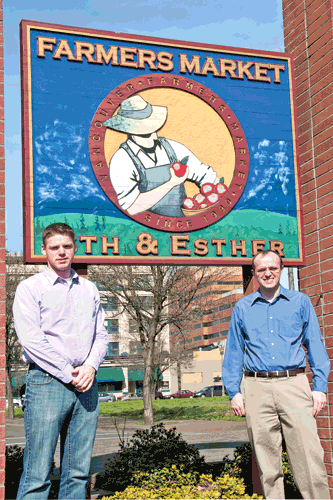
The Urban Abundance program was founded in 2010, and is the local identity for Slow Food USA. Urban Abundance recently launched their Backyard Bounty Co-op, a marketing co-op for urban farmers.
“The co-op lets farmers focus on growing, while Urban Abundance does the accounting, marketing and staffing of farmers market booths,” said Neth.
He said they hoped to expand their reach in the community this year by erecting pop-up booths in certain areas of Vancouver, to sell produce left over from the main market. Although he said Urban Abundance and the city of Vancouver were “still working out the details of how to control traffic without stifling entrepreneurship,” he was interested in communicating with businesses interested in hosting such booths, in “high traffic areas with accessible parking.”
Another recent effort for Urban Abundance is a microgreens project. These salad greens are grown in greenhouses, and will be available year ‘round. Currently, they are available in the Vancouver Food Co-op, located in downtown Vancouver, and at the Neighbor’s Market in uptown Vancouver.
“We’re looking to be able to grow more food during the winter,” said Neth.
Expanding the local food movement into the winter months is something that the Vancouver Farmers Market is also exploring.
“Farmers are looking for year-round farming, and customers are looking for year-round fresh vegetables,” said Jordan Boldt, executive director of the Vancouver Farmers Market. “We provide an outlet for customers and farmers to connect.”
Jim Mains, president of the Board of Directors for the Vancouver Farmers Market, said that the market is now debt-free from its ill-fated experiment with an indoor market, and is “building on lessons learned” to “become a success for all of downtown Vancouver.”
Last year, according to Mains, the market held a Thanksgiving market focused on agricultural products and a winter market in December that featured local artisans. This year, he said, they hope to work with the Vancouver Rotary and Vancouver’s Downtown Association to integrate the market into more events, such as the Christmas Tree Lighting. He also said the Vancouver Farmers Market board is actively seeking input from vendors, to see what is most important to them.
“In the coming year or two,” said Boldt, “you will definitely see expansion beyond the Saturday/Sunday market. We’re poised for new and exciting things!”
The community’s increasing interest in accessing locally grown food is attracting new farmers. For example, Brian Kashas has founded WiseAcre Truck Farm in Camas. He currently has between one-half and one acre in production, and will offer pre-washed, bagged salad mixes as well as “the normal stuff” like carrots, beans and peas, at the Camas Farmers Market this summer.
“There’s a burgeoning market for naturally grown, local produce,” said Kashas, who is a partner with Kashas Construction, in addition to his new farming venture. “People are beginning to question where food comes from and what processes are used.”
And, Kashas pointed out, fresh food is “way tastier, too.”
While new urban growers are popping up like spring crocuses, new players in the farmers market arena are also appearing. For example, Hector Hinojosa, co-owner of JoFoody Catering/ Foody Blues BBQ, is spearheading an effort to launch a Hazel Dell farmers market – perhaps as early as spring 2013.
Hinojosa said that the steering committee is currently negotiating a lease for about 2.5 acres of grassy land off Highway 99. They are also working with a local architect to design the space, and are seeking grants and sponsors to fund the project.
The vision for the Hazel Dell endeavor, said Hinojosa, is an education center that can pass along heritage skills in cooking, food preservation and gardening. Although there are a lot of details to work out, he said plans include greenhouses, an on-site farmer, community gardens, covered stalls and even an entertainment stage.
Despite all the recent efforts, Kashas said that connecting consumers and growers was still a challenge, since small growers don’t have huge marketing budgets.
“There’s still a lot of work yet to do,” said Kashas.



